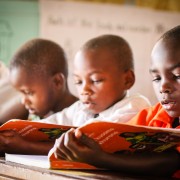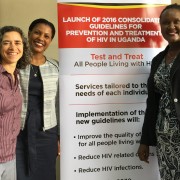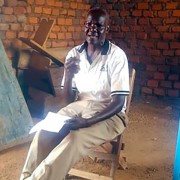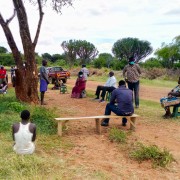Speeches Shim

When disasters, conflicts and other crises occur, women and children often suffer the most. Children can experience violence, abuse, neglect and exploitation, all of which can have a devastating effect on their lives. And far too often, the structures and systems meant to protect children against abuse are rendered less effective in times of emergency. On March 31, 2020, non-essential services in Uganda, including schools, were closed to help prevent the spread of COVID-19. Now, 15 million children are at home, with basic care needs normally met by schools falling to families. And while such lockdown measures have helped to contain the spread of COVID-19 in Uganda, reports of child rights violations have increased.

As the COVID-19 pandemic continues to impact our lives, many Ugandan colleagues are working behind the scenes to ensure that people continue to receive critical health services.
Ms. Jacqueline Calnan, the deputy team leader for HIV/AIDS in the Health and HIV/AIDS Office at USAID/Uganda, is one of them. She has been working tirelessly to ensure that people living with HIV/AIDS continue to receive life-saving antiretroviral treatment (ARV) during the lockdown.

We woke up one day and our world had changed. The novel coronavirus disease (COVID-19) had arrived. As a lockdown was put in place to mitigate the spread of the virus, plans and daily routines ground to a halt. Communities and individuals alike tried to figure out how to adapt to a world transformed by stay-at-home orders and physical distancing.

In some of the poorest and most vulnerable regions in Uganda, where people lack basic necessities such as food and running water, access to information is also difficult. The role of local traditional leaders as trusted messengers is essential, particularly during crises such as COVID-19. USAID’s Integrated Community Agriculture and Nutrition Activity, or ICAN, partners with cultural and traditional leaders as key change agents.

Over the past two years, approximately 250 miners have been mining and trading peacefully with the community in Rupa, in the Moroto district of Karamoja. But in March 2020, with the arrival of the novel coronavirus disease (COVID-19), the miners—Ugandans from other communities and non-Ugandans from the neighboring countries—were told to stop work and close the mines to comply with the president’s order to close all public activities. Fearing the spread of the virus, the local community accused the miners of hosting relatives and outside visitors. As the situation escalated, miners were forcefully evicted from their properties and their shops, livestock, and personal belongings looted.

Comment
Make a general inquiry or suggest an improvement.